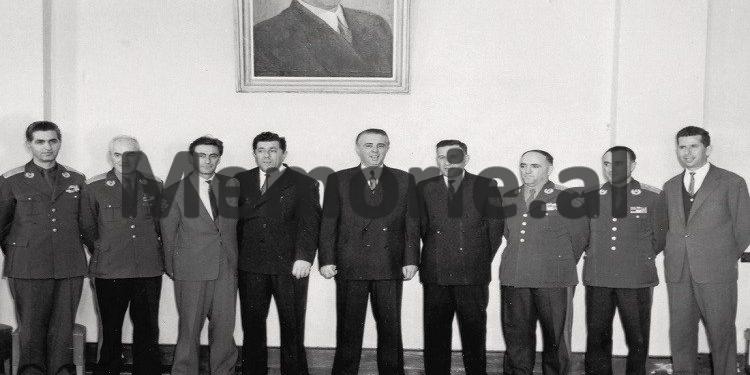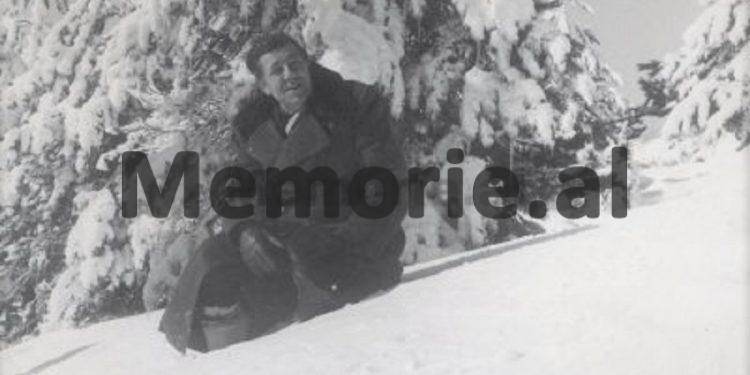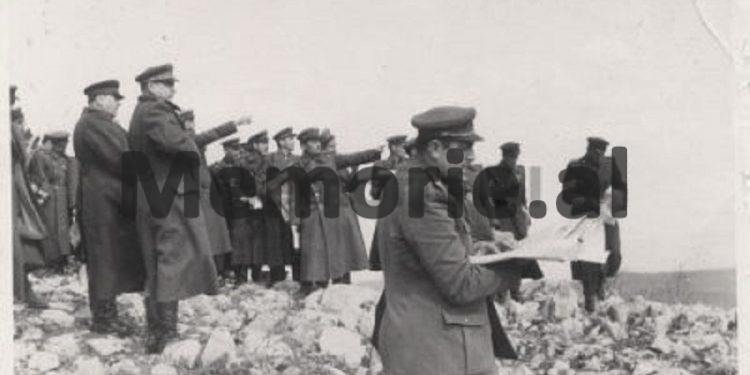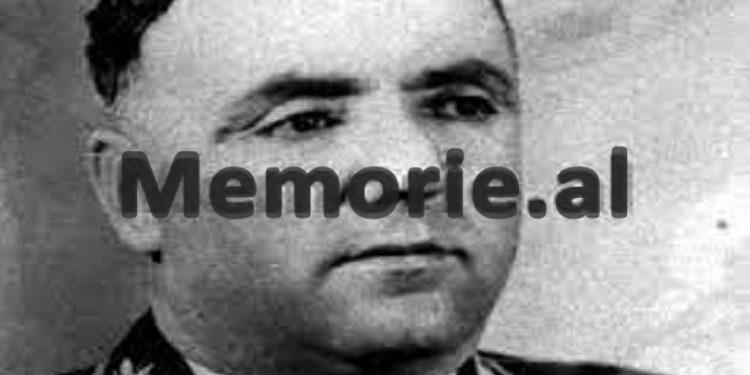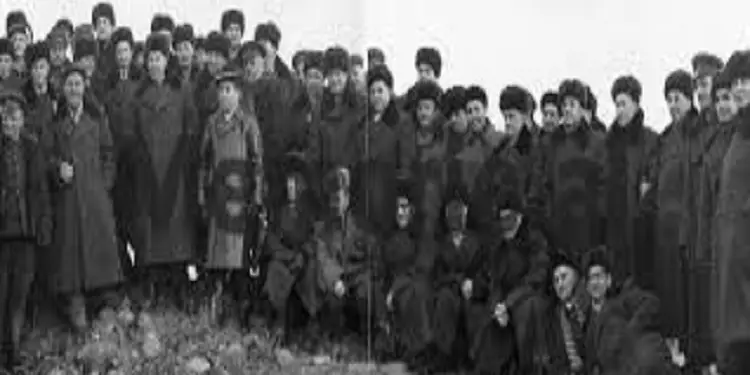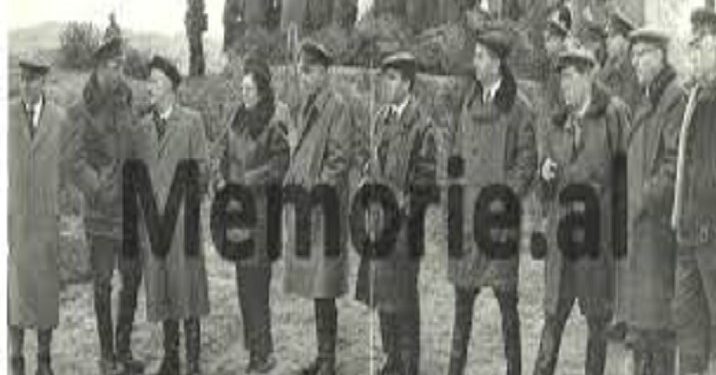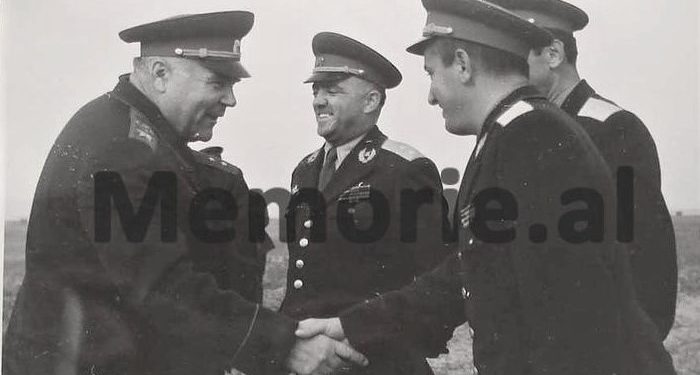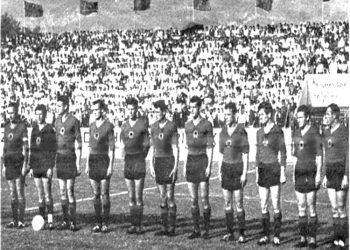By Bashkim Trenova
Part forty-nine
Memorie.al publishes the memoirs of the well-known journalist, publicist, translator, researcher, writer, playwright and diplomat, Bashkim Trenova, who after graduating from the Faculty of History and Philology of the State University of Tirana, in 1966 was appointed a journalist at Radio- Tirana in its Foreign Directorate, where he worked until 1975, when he was appointed journalist and head of the foreign editorial office of the newspaper ‘Zeri i Popullit’, a body of the Central Committee of the ALP. In the years 1984-1990, he served as chairman of the Publishing Branch in the General Directorate of State Archives and after the first free elections in Albania, in March 1991, he was appointed to the newspaper ‘Rilindja Demokratike’, initially as deputy / editor-in-chief and then its editor-in-chief, until 1994, when he was appointed to the Ministry of Foreign Affairs with the position of Press Director and spokesperson of that ministry. In 1997, Trenova was appointed Ambassador of Albania to the Kingdom of Belgium and to the Grand Duchy of Luxembourg. Unknown memories of Mr. Trenova, starting from the War period, his childhood, college years, professional career as a journalist and researcher at Radio Tirana, the newspaper ‘Zeri i Popullit’ and the Central State Archive, where he served until the fall of the communist regime of Enver Hoxha, a period of time when he in different circumstances met many of his colleagues, suckers of some of the ‘reactionary families’, etc., whom he described with a rare skill in a book of memoirs published in 2012, entitled ‘Enemies of the people’ and now brings them to the readers of Memorie.al
Continued from the previous issue
WITH “HEROES OF THE PEOPLE”
POLITICAL BUREAU AND THE PRESIDENCY
In addition to the members of the Politburo I spoke about above, I would also like to say a few words about the candidate of the Politburo, the ‘People’s Hero’, Petrit Dumen. In fact, he had nothing to do with me, except the fact that he was the Chief of General Staff of the Albanian Army, while I was a reserve officer, like thousands of others, who became such automatically after completing their higher studies. Apart from being the Chief of General Staff of the Albanian Army, I also knew Petrit Dumen from Glinka or Gramoz Mborja, my good friend, who was sentenced to several years in prison just because he was his nephew.
My first meeting with Petrit Dumen, the Chief of General Staff of the Army!
The first “meeting” with Petrit Dumen took place in the premises of the Central House of Officers, the same club of Albanian officers. Glinka, I and some other friends and colleagues of Radio Tirana, one evening after work, went there to have a drink. At one point, glancing from the Club’s side terrace, I see Petrit Dumen sitting there in a lonely chair. He had turned his back on the hall and seemed to be meditating. It seemed to me somewhat strange, for someone to come to a club and isolate himself from others in a special space. With this thought in my head, I showed myself ready in front of my friends and colleagues to go to him, to propose to him to sit at a table with us. As I was getting up to invite Petrit Dumes, Glinka, alarmed, grabbed me by the arms and seated me in my chair. I obeyed him thinking he knew his uncle well. Maybe Glinka wanted to avoid any possible unpleasant reaction of his uncle towards us. However, I was impressed by both Glinka’s alarm and the demonstrated loneliness of Lieutenant General Petrit Dumes! Sitting in his chair with his legs slightly extended forward, he reminded me of a painting by Ali Pasha Tepelena, gracefully sucking his hookah. Several times over the years, when the opportunity has come to hear or read something about Petrit Dumen, I have thought of him so alone on the terrace of the Central House of Officers.
I never understood why he had to come there to turn his back on the hall and the people. If he did not need them, a club table, a glass in front of him, or the service of a waiter, why not stay at home or in his office at the Ministry of Defense? Perhaps like all representatives of the pyramid of power, he too sought to be seen by those who were commanded and commanded by him, to be present in the opinion of others, in their discussions, why not even to be worshiped at a distance from them. This may have given him pleasure, which neither his house nor his office in the Ministry of Defense could provide! I first appeared before Petrit Dume in September 1968. In the first days of September of this year, the 5th Plenum of the Central Committee of the Labor Party was held, as well as an extraordinary session of the Assembly was convened Popular. The party and the Council of Ministers proposed to the People’s Assembly to denounce the military organization of the ‘Warsaw Pact’. This Treaty was dominated by the Soviet Union and included all the communist satellite countries of Eastern Europe. Until this time, Albania was formally a member. Practically, with the break-up of Soviet-Albanian relations in 1961, Albania had ceased to be a member of this military bloc. Now she was officially declaring that she was leaving the ‘Warsaw Pact’. The Albanian deputies, according to the usual ritual, approved with applause the proposal of the Party and the Council of Ministers.
The reason for this step was the aggression undertaken by the ‘Warsaw Pact’, under Soviet domination, against one of its members, Czechoslovakia. The Albanian leadership condemned this aggression, calling it social imperialist. She was also afraid that the Soviets would interfere with their tanks in Albania, as they did in Czechoslovakia. An intervention of the ‘Warsaw Pact’ in Albania was possible while she was still a member of this Treaty. By denouncing him and leaving him, the Albanian communist leadership calculated to avoid the recurrence of Czechoslovakia in Albania. The main thing was to avoid her removal from power. This is what happened in Czechoslovakia after it was invaded by Soviet tanks. The leaders of the Communist Party of this country were replaced by loyal people of the Kremlin.
After the withdrawal of Albania from the ‘Warsaw Pact’, all the Party propaganda started an intensive campaign trumpeting the heroic resistance of the Albanian people for centuries. In all institutions and in every corner of Albania, measures were taken and orientations were given to live, think and act as in a siege, as in a war situation. My colleagues and I of the Albanian Radio and Television were invited to report to the military ward where we did the drill, as it was called the military training of 20-25 days a year, which all Albanians did during the dictatorship. In fact, a general mobilization was declared, which was officially tasked with resisting an expected aggression of the Warsaw Pact, to protect the Homeland from Soviet social imperialism.
I did not answer this call. I did so, not because I had realized the futility of this entire grotesque spectacle with patriotic and comic notes. The Directorate of Radio Tirana told me, as well as my colleagues, to continue working normally because even in time of war, propaganda will continue. For her part, a list of employees of Radio Television was presented to the Central Committee of the Party, who would not appear in the respective military units. Otherwise, radio and television broadcasts would be jeopardized. As I will find out later, I was probably not involved in it. I could have been involved, but the list, perhaps, has not been fully approved by the Central Committee of the Party. I think so because I had some worries.
How they took me home at night with the “Gas” of the Military Branch and put me in custody!
One evening after midnight, after the general mobilization had ended and the people had returned to their normal lives, some soldiers knocked on my door. They told me that they had orders to go with them to the Military Branch of the capital, as it were, to the “ministry” of Defense of the city of Tirana. Without further ado they told me to get on “Gaz”, the same military vehicle with which they had come to me. I did as the troops ordered me to do so and after a few minutes I was in the main hall of this military center where 200 or 300 people had gathered. I was impressed that we were not allowed to go outside in the yard. The door of the hall where we were was guarded by armed soldiers and bayonets in combat condition. In a way we were in a state of arrest. As we would later learn, this measure was justified by our failure to respond to the call made to us when the Homeland was in danger!
It seemed as if the Military Court was waiting for all of us, about 200 or 300 people. If it took place, this would probably be the largest Military Trial in history. In fact some moves were even made in this direction. In the early hours of the morning, some people in uniform came to the offices of the Military Branch and started interrogating us all one by one. We had to explain why we had not responded to the military call made to us after Albania’s withdrawal from the Warsaw Pact. After giving the explanation in front of some soldiers in one office, we had to move to another neighboring office and answer the same questions to another group of soldiers. Then I did not pay attention to all this staging, which I saw even with a kind of humor. Of course on the other hand, the stuntmen, the military prosecutors, were serious. The questions were asked by them quite formally. They did not even hear our answers. The decision, it seems, had been made. We had to go to the Military Court, where we would be notified of the “deserved” sentence. A friend of mine, Albert Shala, the prosecutor had openly said: “If I do not put you in prison, it will be Petrit Dume who will put me there in your country.”
After a few hours, after the questions and answers were over, we all lined up like in the army. The Chief of General Staff of the Army, Lieutenant General Petrit Dume arrived at the Military Branch. He began questioning some of those lined up, as military prosecutors had done before him. I remember when he stopped in front of a young man with a regular body, placed somewhere less than a meter away from me. I later learned that he was a physical education teacher and that he was originally from Dibra, just like my father. Petrit Dume passed in front of me, glanced at me blankly, went further and stood in front of him. “But you ‘, the general said to the physical education professor,’ why did not you show up at your military unit”?! His response was simple, humane, but shocking to the general. “I got married that evening, Comrade General,” said the physical education professor, whose name I could not learn. Seeing the general’s bitter reaction, he added: “I could not leave the 100 people I had invited to my wedding”! General Petrit, who did not expect such an honest answer, to the point of naivety, became furious. It seems to me that he was holding his mouth slightly. Thus, with anger and halved words, Petrit Dume addressed him: “How do you say, we tell the enemy wait for the wedding to end I then attack us?”Everyone,” he said, “will go to the Military Court!” To be honest I did not believe his words even though, knowing the military logic, I had no reason not to believe him.
Two weeks in the military choir in Vaqarr, with the instrumentalist of the Radio Tirana orchestra!
After these words, Petrit Dume left. We were sent to the relevant military units. I was sent to Vaqar, a village near Tirana. There, along with about 50 or 70 others, I stayed a couple of weeks. From Radio Television were only me and Pirro Xhahini, who worked as a cellist in the Symphony Orchestra of the Albanian Radio-Television. Initially, after wearing the military uniform, we were ordered to design our own “apartment” by cutting tree branches for the “walls” and its “roof” and branches of shrubs for the “bed” lying on the ground. We were separated by two people for an “apartment”. I was assigned to live with Piro Xhahin, who was not only a talented instrumentalist, but also a wonderful, generous, wordless and open-minded, straightforward guy. Those difficult days in Vaqar made me know better what, to me, as well as to my colleagues, from a distance seemed to me as a special type, as very closed and withdrawn. Renée Anderson, the Party friend who worked on the French show, when she saw him on the radio in the lobby of her Symphony Orchestra, laughing and comparing him to an American actor. Renée also said his name, but I do not remember, since at that time we did not even know American actors. American films and generally Western films, as well as Soviet and Soviet bloc films, were not shown in Albania at that time for ideo-political reasons.
How did the news spread all over Tirana that we would be killed in Vaqar!
During the two weeks we stayed in Vaqar, we did everything as in the usual military exercises during the year, ie nothing extraordinary, nothing to testify to a special preparation on the eve of an expected aggression. The military unit command took advantage of the opportunity to get us ready to make concrete and lay some military depots with it. In our free time, we also organized some football matches. Meanwhile, I do not know how and by whom, the news was spread that those of us who had gathered in Vaqar would be killed, that is, we would be sentenced to death. Many alarmed family members flocked to meet their loved ones, perhaps for the last time. No one from my family moved. Maybe the news had not reached my house. Maybe they had not believed him.
In Albania, during the dictatorship, you often did not know whether to believe or not to believe a news story. It was often said that behind him stood the enemy, seeking to arouse resentment and confusion. We also knew that the dictatorship itself, through its agents in the State Security, often spread the news in the form I said and said. The reasons were many and varied. It may have set a trap. It is possible that public opinion was tested, etc., etc. If, in this case, this opinion has been tested, surely he has not supported the sentence by the Military Court of hundreds of people at once, despite the fact that the Party did not lack super patriotic “arguments”! Such a sentence would turn against the dictatorship itself, even in silence. However, we returned to our family’s alive and started work, as if nothing had happened. Never again has anyone mentioned this whole noisy and threatening story. Even Piron and I never remembered him during the following years, when we met to have a coffee at the club of Sultana, the bartender of the small club on the Albanian Radio Television. I was more interested in learning something from his musical culture, while the polite one, to give me a chance to speak, asked me about political developments in the world. Now, more than 40 years later, these notes take me back to those days.
I have met with Petrit Dumen two or three other times in the large military exercises, which were organized by the Ministry of Defense within its programs – “Army of all military people”. In the dictatorship, the Albanian army was built on this concept. It was not a barracks army. Part of it was the whole people, who were considered soldiers and who had to be prepared militarily. I do not know if up in the communist dome or in the Ministry of Defense, they really believed in the “Army of the Soldier People”! Rather I want to believe that the leaders of communism or communist power did not trust their slogans, but in the absence of arguments, of a strong persuasive logic, used them to impose their dictates, to terrorize and kneeling the people. I say so keeping in mind, in this case, how these exercises took place, how formal and unreal they were and how they were propagated.
During the march on the military bird, Petrit Dumja told me: You are not after the captain!
I remember such a workout. We had amassed several hundred reservists, intellectuals, workers and peasants. After putting on our military uniforms and equipping ourselves with personal weapons, Kalashnikovs and pistols, certainly without bullets, we embarked on a long march that lasted for several days and several nights, without ceasing. I remember when, as always in such exercises, overwhelmed by exhaustion, we were crossing the Papri stream, we heard some shouts from afar: “Petrit Dumja, Petrit Dumja”! Petrit Dume was approaching. Everyone was worried. We were all afraid that he, noticing how we were dispersed, might give an order, which would further aggravate our situation. In order not to confront him, the reservists began to quarrel even more. I told those who happened to be near me, but who were not under my command as reserve officers, to line up. They obeyed. They could not have done otherwise, because Petrit Dume did it in front of us. I broke away from the reservists and presented myself to the general, honoring and reciting the relevant formula according to the military regulations: “Comrade Chief of the General Staff of the People’s Army, according to your officer orders … you are presented …”! Under my gymnastics I had inserted a portable radio, which I had taken with me. She had swollen my stomach and this could not help but notice the general. Angry, he said to me, “What officer are you? You are not even a captain. You do not even deserve to be a soldier”! It seems to me that he was completely right. I, who did not know how to act because the regulation, as far as I knew, did not provide for similar situations, honored and after a while left with a military step. I believe that I was funny, because you could not leave with a military step in a stream full of small and big wells, but even for this case I had not read anything in the military regulations. However, this meeting with Petrit Dumen passed easily. He left and right after him we regained the previous state, completely shattered.
This did not happen in another major exercise, or as they were called in military language, in another “game.” I believe that they were called “game”, since they imitated a war situation in peaceful conditions, so you prepared in what was called “game”, to be killed in the situation that was imitated, in war, to shoot with false bullets, to learn to kill or be killed by real bullets. The “game” was not like that at all, or if we were to call it that, it was a game of nerves and our lives in time of peace and a game of death in time of war. I do not remember exactly the year when a big “game” was organized during which our 1st Brigade marched day and night, passing completely disoriented through the hills of Tirana, Elbasan, Dumre, Myzeqe, Peqin and Kavaja. . At one point the training command gathered us in the yard of a village school, to draw the conclusions of the “game”. So it was said that the training had ended, as always, successfully. There was no way it could have happened otherwise. Socialism in all fields and in every activity, knew only successes, we lived passing from one success to another, from one victory to another! This was the official language. This language was also spoken by the training command. We rejoiced certainly not in the successes, but in the very fact that our exhaustion finally came to an end. It turned out that we were happy ahead of time and that on the command of the exercise, there was a commander, who thought differently.
As we were returning, by the river Shkumbin, we saw Petrit Dume approaching us. Usually he attended training exercises on a white horse. This time, as we were told, a military helicopter had landed there. Near our company there were also two or three reservists, who had left an antitank on the side of the road. They no longer had the strength to carry this weapon carrying it on their shoulders. They were told that once the drill was over, the antitank would be loaded onto a mule and transported by it, so the mule would do their job or they had done the mule duty by now. Petrit Dume, as he approached, saw the anti-tank set aside. Reservists told him they were waiting for a mule to arrive to load it. The general strongly objected. “This weapon belongs to you.”You will keep it until the end,” he said. After finishing the mule story, Petrit Dume addressed the rest of us. “You will all come back.”The game will start from scratch,” he said. It turned out that the conclusions of the training command had been false, that the training or “game” had not been carried out successfully, or that the general needed another success over the success already achieved, or, or, the general was making fun of everyone and enjoying himself. With his mockery. In parentheses, I want to add that for similar behavior of Petrit Dume, I also read in the Albanian press of the post-dictatorship years. He experimented, for example, with the youth of the Skënderbeg Military School. Petrit Dume sent them on long marches through uninhabited and unexplored mountains by human foot, giving them only two biscuits a day as food. He wanted to test the resistance of our military!
We could not follow the order of the Chief of General Staff of the Army. That order was completely illogical, but the army does not function on the basis of logic, but of orders and obedience to them, otherwise it disintegrates. So we all went back. We began again to meander in the darkness through the labyrinths of endless hills, without any target, without any new order of action. Fatigue weighed on our limbs like lead bullets. Destruction and disorganization reigned everywhere. We did not know where we were going, nor how much we were going to march, we were just walking, or rather, we were just crawling like a shadow of hell that we would destroy every enemy, NATO, the Warsaw Pact, and these two military blocs if they were to bargain and attack us together! In this training, I was together with my friend and colleague from Radio Tirana, Hysni Lita. At one point we could no longer walk, our feet would not obey us. We decided to step into a field planted with corn and spend the night there, to get some strength to continue our crazy march. As we began to nap as if we were in the beds of a five-star hotel, we heard voices calling out. Memorie.al
The next issue follows




